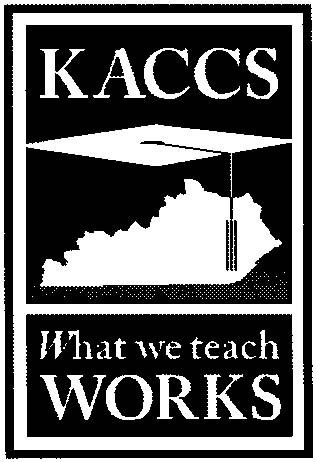Features on new webinar series, Kentucky legislative session, Council on Post-secondary Education 2020 Progress Report. Click below to read the news today!
Category Archives: Documents
Covid-19 Guidance on Distance Learning, SAP and R2T4
KACCS member colleges and schools that participate in the U.S. Department of Education’s Title IV Federal Student Aid programs are working diligently to accommodate the lapses in on-campus, on-ground instructional delivery during the social distancing protocols devised to reduce the spread of the Covid-19 virus.
In response to requests for information, the Association has extracted guidance from the ED.Gov regarding regulatory requirements for Distance Learning, Satisfactory Student Progress and Return to Title IV funds. Please download the information below and note the additional resources and links contained in the document.
Until this challenge to community health and student/staff well-being is met and addressed, KACCS will continue to research and share information that is intended to minimize the disruption of education and instruction for career college students.
Reinventing college admissions with eye on retail dynamics
“I was asked what I thought higher education would look like in the future. My answer was that what we think of as the “higher education industry,” would be smaller with many fewer institutions and that those that survived would look a lot more like retail businesses …”
“… In short, the structural factors that historically insulated colleges from competition in the past have been breeched and viewing students as retail customers has become central to survival across much of higher ed. The most obvious and common retail practices visible in the academy today include approaches to … (To view full article, click link below)”
https://wallacekpond.com/2020/03/02/higher-education-as-a-retail-business/

2020 Board of Directors
PRESIDENT: Chris Ernst, VP of Operations, Sullivan University
VICE PRESIDENT: Brenda Evans, College Director, College for Technical Education
TREASURER: Brett Weber, Chief Operations Offcier, ATA College
IMMEDIATE PAST PRESIDENT: Cindy Landry, Director of Accreditation & Compliance, ATA College
Robin Boughey, Executive Director, MedQuest College
Sarah Clark, Campus Director, Emergency Medical Training Professionals of Kentucky
Tom Cropper, Principal/Director of Career Services, MedQuest College
Dr. Jay Marr, CEO, Sullivan University
Joel Musgrove, Campus President, University of Fairfax
Di Tran, CEO, Louisville Beauty Academy
Diane Wolfer, President & CEO, Beckfield College
Stuart Grinell, VP of Business Development, Ambassador Business Solutions
Katie Mahan, Senior Account Manager, McGraw-Hill Education
Executive Director: Anthony S. Bieda
Legislative Liaison: Greg Brotzge
Click on link below to access contact information.

Suite 172-243
Louisville, KY 40207
How to disrupt higher ed (in a good way!)
SEI executive Karl McDonnell notes that college students aged 25 to 34 increased enrollment by 35% between 2001 and 2015, and are expected to grow by another 11% by 2026. He recommends operational focus on 1) economic mobility/employability, 2) flexibility/affordability, and 3) engaging educational content as three ways to disrupt and transform higher education delivery, services and outcomes.
SEI supports educational ROI (return on investment) as an important consideration of the value post-secondary education to students. The author further cites “net present value” measured over a span of 40 years as “the most comprehensive benchmark” for judging value.
The report also describes revisions to general studies curricula, a subscription-based tuition model, and documentary-style course content to enhance and engage student learning.
To read more: “It’s Time to Disrupt Higher Ed. Here’s How.“ By Karl McDonnell, Dec. 19, 2019. https://www.washingtonpost.com/brand-studio/wp/2019/12/19/6566/
2020 Key Dates for KACCS
The calendar of meetings, conferences, regulatory and legislative milestones is available for review and consideration.
New study explains gaps in higher ed filled by career colleges and schools
Research published by Laura Beamer and Marshall Steinbaum describes the “drastic inequality along lines of race, gender, class and geography” that in many cases is remedies only by the presence of a proprietary college or school. The authors note the persistence of “education deserts” generates “sparse” political attention, even though the phenomenon has a great deal to with the holy grail of post-secondary education: access.
The study, entitled “Unequal and Uneven: The Geography of Higher Education Access” introduces a new metric, the SCI (school concentration index). Those markets with an SCI of 10,000 or higher are considered “education deserts.” The consequence currently applies to more than 40.8 million people in the U.S.
The research also explains how proprietary colleges and schools frequently step in to serve the education deserts, or markets with no more than one public institution within a 45-minute drive. “In the years after the financial crisis, when ‘retraining’ was the watchword of the day, research has demonstrated the demand-responsiveness of private for-profits.”
To read the full report, go to https://phenomenalworld.org/analysis/geography-of-higher-ed
90/10 Accountability for all…
… and the endorsement of Sen. Mike Enzi’s legislative proposal to apply measures of institutional effectiveness to all institutions of higher education, not just proprietary colleges and schools. Read the letter sent to Capitol Hill by the leadership of KACCS.


KACCS endorses UofL Health developing biomedical campus in Louisville
KACCS has sent a letter to the Courier Journal endorsing the need to integrate Jewish Hospital & KentuckyOne operations into UofL Health, resulting in greater biomedical economic development for the Kentuckiana region. Read the full text below.
The Industry Partners of KACCS
Visit the websites of the vendors, exhibitors, consultants and professionals who support the enterprise of the Association with presentations, sponsorships, participation and resources. They make KACCS stronger and more valuable to member institutions!
House version of HEA restricts choice for Veterans

Veterans for Career Education (VCE) provided details today of provisions in the House version of the reauthorized Higher Education Act that would restrict access to proprietary career colleges by veterans and their family members.
“If this bill passes in its current form, Congress is essentially telling veterans that they are incapable of choosing the school that best fits their career goals,” VCE said from Washington, D.C.
For more information go to https://www.vetsforcareered.org/
Read “Career Education Focus”
The Fall 2019 Edition of the Newsletter of KACCS
KACCS sets priorities for HEA reauthorization
In a letter to Rep. Brett Guthrie (Kentucky’s 2nd Congressional District), the organization lists its priorities for Congressional reauthorization of the Higher Education Act, which guides the regulation of all colleges and universities in the U.S. whose students receive federal financial aid.
The correspondence reads, in part: ” We believe strongly that a level playing field must be established and preserved for all education providers regardless of their tax status…Protect(ing) the ability for veterans and service members to use their earned benefits at the college or school of their choice… and preserv(ing) and expand(ing) student aid for quality and effective career education programs as short as eight weeks in length, to promote more agile training sector responses to current and emerging workforce shortages.”
Read the full letter at the link below.
Career Education Focus
Summer 2019 Newsletter of the Kentucky Association of Career Colleges & Schools
Ernst named KACCS President
LOUISVILLE – Chris Ernst, Senior Vice President for Administration at Sullivan University, has been elected president of the Kentucky Association of Career Colleges and Schools (KACCS).
Ernst, a Louisville native and Sullivan University graduate, officially began his tenure as president during the Aug. 9 KACCS annual conference, which was held at Sullivan University in Louisville. He follows past presidents Cindy Landry of ATA College and Jan Gordon, also of Sullivan University.
As KACCS president, Ernst will manage the business and affairs of the organization while reporting to the KACCS Board of Directors and membership.
ALERT: Veterans earned education benefits at risk…
Wanted: New members…
… to join the premiere Career College association in the Commonwealth of Kentucky. Join now and gain “member” status when you register for the 2019 Conference and Exhibition, “Navigating change through innovation.”
Veterans deserve choice in seeking work-ready education
By Cindy Landry, President
Persistent and detrimental gaps between the skills profile of available workers and the skills profile sought by employers continue to suppress the economic vitality of communities in every sector across the U.S., including manufacturing. (“Skills Gap and Future of Work,” 2018 Study by Deloitte & The Manufacturing Institute). The problem is vexing: in spite of its high profile, the sectors and institutions – public and private – with the resources and expertise to close the gap have fallen short of making substantial impact. “Gap closing” requires diligence, collaboration, coordination and sophistication. And it requires all relevant actors, working in synch, to lower the barriers to comprehensive and effective skills development. The skills gap will remain significant until and unless all post-secondary sectors are contributing capacity to its mitigation through the delivery of work-ready education.
Among the demographic sub-sets most beset by the skills gap are veterans and military personnel pursuing economic opportunity in the civilian sector. Technical and teamwork aptitudes that are honed in the armed services must be harnessed to enhanced communications, human relations, critical thinking and marketplace awareness skills required by civilian employers. Career colleges and schools offer programs in professional, occupational and technical fields that bring together military readiness and contemporary work-ready education. Proprietary education is focused on flexible time, place and mode of instruction delivery to accommodate working adults. Further, the sector’s colleges and schools enlist faculty and support staff with direct, current knowledge of the contemporary workplace. The institutions thrive when students engage and complete career education in a timely, successful manner.
How well do proprietary colleges and schools serve veterans? Gallup Research recently conducted a national Student Satisfaction survey of private career colleges and schools and found that 76% of veterans said their degree/certificate was directly related to their work; 71% said they were satisfied with their education; 63% said they would recommend their institution to a fellow Veteran, friend or family member; Veterans experienced a 39% increase in their annual income compared to their income before attending our schools.
Furthermore, a joint study by Student Veterans of America revealed that student veterans at private career colleges and schools are succeeding at levels comparable to, if not greater than, their peers elsewhere. Other recent and recurring research underscores the value of career and skills-formation education in terms of enhanced earnings and sustainable full-time employment, compared to individuals who opt out of attaining non-degree credentials. (“Non-Degree Credentials Boost Employment and Life Outcomes,” Rhea Kelly, May 2019, Campus Technology.)
Unfortunately, proposals to marginalize or eliminate veteran participation in proprietary education are part of legislation that is under consideration by the U.S. House of Representatives. Provisions in Higher Education Reauthorization would modify the 90/10 ratio (federal funds/non-federal funds) and apply Veteran’s education benefits as well as tuition assistance for active military to the “federal funds” side of the ratio. Those restrictions constitute substantial disincentives for current and former military to enroll at proprietary colleges or schools, regardless of the institution’s programs, their fit with the needs of the student, or the institution’s effectiveness. The broad-brush proposal will greatly impede the ability of an important work-ready resource to be applied toward shrinking the skills gap.
In the Commonwealth of Kentucky, the risk of these potential changes in federal education policy threaten choice and access by thousands of students, and imperil the financial viability of dozens of small, privately-owned and operated career colleges that have been faithfully and effectively serving more than 30 Kentucky communities for more than a century.
The demographics of students enrolled at career colleges in Kentucky spans the full spectrum of diversity, with strong participation by women, minorities, veterans and individuals from low-income and disadvantaged backgrounds. They have access to programs that align and respond to workforce gaps.
The geographic reach of KACCS member institutions, coupled with their relevant programming, outstanding student services and adult-learner-friendly operation makes them valuable resources to the commonwealth’s initiatives to close skills gaps. The performance, longevity and persistent engagement with the workforce development community magnifies their impact and effectiveness.
Federal and state policies that acknowledge the valuable resource of the career college sector and promote its full participation are meritorious and worthy of celebration. Efforts to marginalize the Kentucky proprietary education through constrictions to federal policy undermine best efforts to develop a work-ready labor pool, and unfairly diminish education options for men and women in uniform and their discharged cohorts.
Congress is well advised to delete these provisions from HEA legislation that moves to the floor of either chamber. Closing the skills gap through abundance in work-ready education depends on it.
Exhibitors Wanted! Register here for 2019 Conference to reach clients and decision makers…

KACCS Spring 2019 Newsletter
In this edition: Legislative Wrap-Up; Congress considers reauthorization of the Higher Education Act (HEA); News & Alerts; Calendar.

